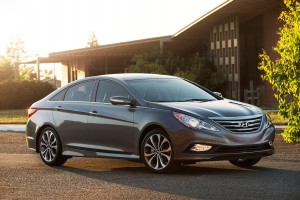
The 2014 Sonata is part of a 1 million vehicle recall for seat belt problems related to the midsize sedan.
A seatbelt defect, linked to at least one known injury, is leading to the recall of nearly 1 million Sonata sedans sold in the U.S. by Hyundai Motor Co.
The recall covers versions of the conventional, gas-powered midsize model sold during the 2011 through 2014 model-years. The 2011 to 2015 model-year Sonata hybrid is also covered, according to a new report published on the website of the National Highway Traffic Safety Administration.
The Hyundai recall is the latest in a series of large recalls reported by automakers domestic and foreign. And it comes just days after federal regulators revealed that safety-related callbacks hit another all-time record in 2016 – for the third year in a row. A total of 53.2 million vehicles were involved.
(For more on the 2016 recall record, Click Here.)
What is particularly worrisome for safety advocates is not just the overall surge in recalls – which appears to reflect a broader crackdown by both government and industry on defects – but the fact that so many of those have involved hardware and software designed to enhance vehicle safety.
According to Hyundai, a defective anchor may not have been properly latched in place when those Sonata sedans were assembled. That could cause the belts to come loose in the event of a crash. At least one injury, the result of a 2013 accident, has been reported so far.
Ford, for example, recalled 650,000 vehicles due to a seatbelt defect last December. A month earlier, Volvo issued a similar callback order covering 74,000 vehicles because of seatbelts that could fail in a crash. And General Motors announced the recall of more than 1 million trucks in April of last year because of a seatbelt defect.
The list of faulty safety gear covers hardware, such as engines, as well as the software used to operate various safety features such as anti-lock brakes and the deployment of airbags following a crash.
(Click Here for details about Hyundai’s midcycle update.)
But, by far, the biggest such problem has involved defective Takata airbags. Due to design and manufacturing problems – compounded by a corporate cover-up – more than 40 million vehicles sold in the U.S. equipped with airbags from the Japanese supplier have so far been recalled. And the National Highway Traffic Safety Administration has laid out plans for a phased-in recall of millions more over the next several years.
The inflators used in most Takata airbags can become unstable when exposed to high temperatures and humidity, especially in places like Southern Florida. Meanwhile, an industry research panel found the explosive ammonium nitrate used in those inflators also starts to break down as the bags age. That can cause the bags to explode with unexpected force, sending shrapnel into the passenger compartment. At least 15 people have so far been killed, with over 100 injured worldwide.
Takata last month said it would plead guilty to criminal charges in U.S. District Court, while also paying $1 billion in fines and other fees.
(Hyundai quarterly profits take another hit. For the story, Click Here.)
The surge in recalls over the last few years has also involved a variety of other issues, including excess corrosion and engines that can stall unexpectedly. But the biggest surge in the numbers has involved defective systems specifically designed to prevent crashes or reduce the risk of injuries and death in the event of a collision.
